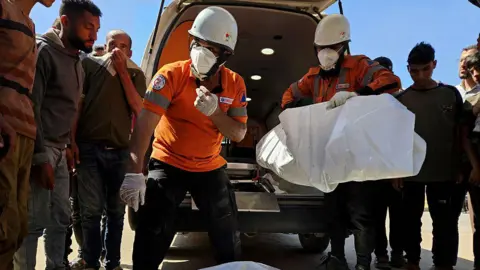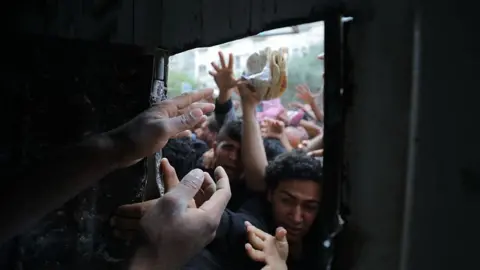Israeli strike kills nine of Gaza doctor's children, hospital says
 Getty Images
Getty ImagesAn Israeli air strike on Gaza hit the home of a doctor and killed nine of her 10 children, the hospital where she works in the city of Khan Younis says.
Nasser hospital said one of Dr Alaa al-Najjar's children and her husband were injured, but survived. Graeme Groom, a British surgeon working in the hospital, said he had operated on her surviving 11-year-old boy.
A video shared by the director of the Hamas-run health ministry and verified by the BBC showed small burned bodies being lifted from the rubble of a strike in Khan Younis on Friday.
The BBC has approached Israel's military for comment.
In a general statement on Saturday the Israel Defense Forces (IDF) said it had struck more than 100 targets across Gaza over the past day.
The health ministry said at least 74 people had been killed by the Israeli military over the 24 hour-period leading up to about midday on Saturday.
Dr Muneer Alboursh, director of the health ministry, said on X that the al-Najjars' family house was hit minutes after Dr al-Najjar's husband Hamdi had returned home after driving his wife to work.
Dr Alboursh said the eldest of Dr al-Najjar's children was aged 12.
Mr Groom said that the children's father was "very badly injured", in a video posted on the Instagram account of another British surgeon working at Nasser hospital, Victoria Rose.
He said he had asked about the father, also a doctor at the hospital, and had been told he had "no political and no military connections and doesn't seem to be prominent on social media".
He described it as an "unimaginable" situation for Dr al-Najjar.
Mahmoud Basal, spokesman for Gaza's Hamas-run Civil Defence agency, said on Telegram on Friday afternoon that his teams had recovered eight bodies and several injured from the al-Najjar house near a petrol station in Khan Younis.
The hospital initially posted on Facebook that eight children had been killed, then two hours later updated that number to nine.
Another doctor, Youssef Abu al-Rish, said in a statement posted by the health ministry that he had arrived to the operating room to find Dr al-Najjar waiting for information about her surviving son and tried to console her.
In an interview recorded by AFP news agency, relative Youssef al-Najjar said: "Enough! Have mercy on us! We plead to all countries, the international community, the people, Hamas, and all factions to have mercy on us.
"We are exhausted from the displacement and the hunger, enough!"
 Getty Images
Getty ImagesOn Friday, UN Secretary-General António Guterres warned that people in Gaza were enduring what may be "the cruellest phase" of the war, and denounced Israel's blockade on humanitarian aid imposed in March.
Israel partially lifted the blockade earlier this week. Israeli military body Cogat said 83 more trucks carrying flour, food, medical equipment pharmaceutical drugs entered Gaza on Friday.
The UN has repeatedly said the amount of aid entering is nowhere near enough for the territory's 2.1 million people - saying between 500 to 600 trucks a day are needed - and has called for Israel to allow in much more.
The limited amount of food that trickled into Gaza this week sparked chaotic scenes, with armed looters attacking an aid convoy and Palestinians crowding outside bakeries in a desperate attempt to obtain bread.
A UN-backed assessment this month said Gaza's population was at "critical risk" of famine.
People in Gaza have told the BBC they have no food, and malnourished mothers are unable to breastfeed babies.
Chronic shortages of water are also worsening as desalination and hygiene plants are running out of fuel, and Israel's expanding military offensive causes new waves of displacement.
Israel has said the blockade was intended to put pressure on Hamas to release the hostages still held in Gaza.
Israel has accused Hamas of stealing supplies, which the group has denied.
Israel launched a military campaign in Gaza in response to Hamas's cross-border attack on 7 October 2023, in which about 1,200 people were killed and 251 others were taken hostage.
At least 53,901 people, including at least 16,500 children, have been killed in Gaza since then, according to the territory's health ministry.
Additional reporting by David Gritten and Yaroslav Lukov
